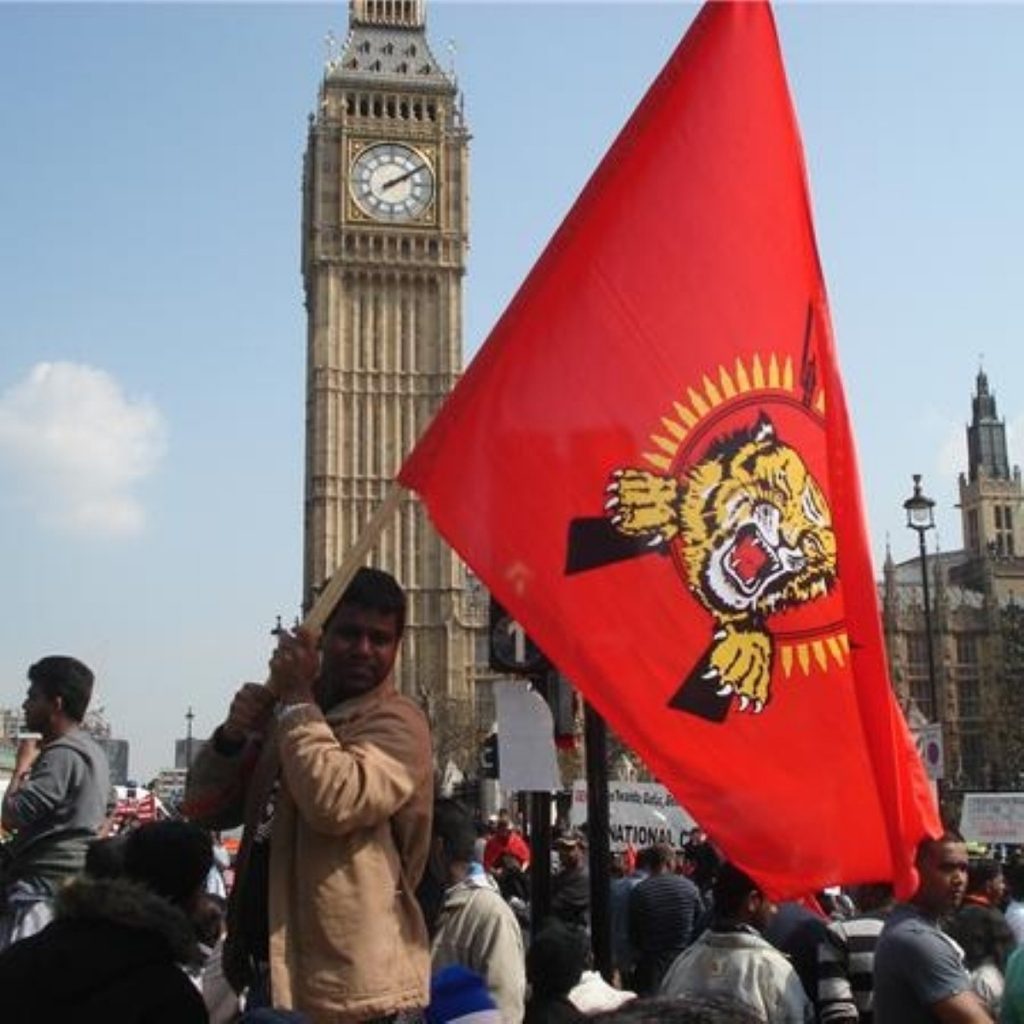Tamil protestors defy police
By Alex Stevenson and Jonathan Moore
Tamil protestors around Westminster broke through police lines and refused to end their disruptive demonstration on roads around parliament today.
Around 3,500 Tamils gathered throughout the day two weeks after a similar demonstration against the lack of a permanent ceasefire between Sri Lanka’s government forces and Tamil Tiger separatists.
The protest was raised on the floor of the Commons, with some MPs – including the speaker, Michael Martin – expressing concern.


Keith Vaz, chairman of the home affairs select committee, told journalists afterwards: “Clearly some members are getting very anxious.”
Simon Hughes, co-chair of the all-party conflict issues group and a member of the all-party Tamil group, added: “Ideally we would like the protest back where it is [on Parliament Square].
“Having spent a long time talking to people in the square, we have to say the police are trying to do a difficult job extremely well.”
At around 10:00 BST this morning protestors pushed a thin line of police officers across the road adjacent to parliament.
Demonstrators then established themselves on the northern and eastern sides of Parliament Square, blocking the roads. Whitehall had to be closed as a result but traffic continued to run from Abingdon Street to Victoria Street.
This lunchtime the Metropolitan police announced their intention to move protestors back into the square.
“After this point officers began to walk through the area requesting people move on to the square and out of the road,” a Met spokesman said.

Their efforts met without success, however, as numbers grew throughout the afternoon. Organisers were seen distributing bottles of water and food to protestors.
“We are all down-to-earth people,” Yogan Yoganathan, a councillor in Kingston, insisted.
“I have already lost 5,000 people. About 70 per cent of them are women and children.
“If Gordon Brown and David Miliband can do something to help Gaza and Israel, why can’t they do something to help us?”
In the midst of the protestors one man continued a hunger strike begun after the last protest in Parliament Square two weeks ago.
Prameshwaran Sabramaniyum, whose parents were killed alongside several of his siblings during recent fighting in Sri Lanka, is now in the 14th day of the protest.
He has secured the pledge of 50 Tamil students that if he passes away they will continue the hunger strike in his name, Janani Paramsothy told politics.co.uk.
A second man, Sivatharsan Sivakumaravel, had suspended his hunger strike after it was agreed he would travel to the United Nations in New York to meet with senior officials.
“No one knows what’s going on in Sri Lanka,” he said.
“All over the world the Tamils are doing protests, hunger strikes. We just want to pressurise the Sri Lankan government.”
‘Siva’ called on the international community to unite in condemnation of the Sri Lankan government. “They are silent. They need to act,” he continued. “They need to be brave and say to the Sri Lankan government: ‘You must stop this’.”
Another British Tamil student, Kristina Nanthagoran from London, said the refusal to allow international media into the warzone was unfair.
“All we want is the truth to be told,” she urged.
“We don’t have anything to hide. We’re all affected. We just want to save our people.”
The Liberation Tigers of Tamil Eelam (LTTE) – or Tamil Tigers as they are more commonly known – are a proscribed terrorist organisation in Britain but the protests are not linked to the group.
The Sri Lankan government has recently stepped up its efforts to crush the rebel group and has them cornered in a small area in the country. However, there are believed to be around 100,000 civilians trapped in the crossfire.
This morning reports from Sri Lanka detailed a government raid after which 5,000 civilians escaped the fighting. A suicide attack by a Tamil rebel in the capital Colombo has killed 17 people.
Foreign secretary David Miliband released a statement this morning saying he was “gravely concerned” about the situation in the country. He called for an immediate ceasefire to allow civilians to leave the area and added: “We are committed to do all we can to bring this terrible conflict to an end.”
Downing Street said this afternoon Gordon Brown had spoken to the president of Sri Lanka seeking reassurances that access would be granted for humanitarian aid.
Tamils and their supporters have been protesting for a few weeks now to draw attention to the 25-year civil war which appears to be reaching its final stages.

